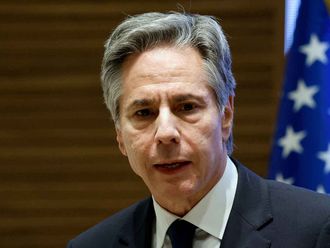London: Britain is expected to fly radical Islamist cleric Abu Qatada to Jordan on Sunday to face terror charges, ending a decade-long legal battle over the fate of the man once dubbed Osama Bin Laden’s right-hand-man in Europe.
London is deporting the 53-year-old Palestinian-born cleric after the two governments last month formally approved a treaty guaranteeing that evidence obtained by torture would not be used against him in any trial.
Prime Minister David Cameron has said he will be “one of the happiest people in Britain” after the departure of Abu Qatada, who has been in and out of British prisons while successive British governments have tried to expel him.
British officials refused to confirm any details, but local media reported he would be driven from the high security Belmarsh jail in south London and flown out at 1am on Sunday from RAF Northolt airbase in west London.
His wife and five children are expected to remain in Britain, where he first came in 1993 seeking asylum.
A Jordanian official said earlier this week that Abu Qatada was expected to leave Britain “in the early hours of Sunday” and arrive later that morning in Jordan.
“He will arrive in Jordan on a military plane, escorted by Jordanian and British guards,” the official said.
The burly, bearded Abu Qatada has been fighting extradition to Jordan for years in British and European courts alike, but his lawyers unexpectedly said in May that he would return there once the fair trial treaty was ratified by the Jordanian parliament.
But officials will be wary of any further last-ditch legal attempts to stay on British soil. A British Home Office spokeswoman said: “Our focus is on seeing Abu Qatada on a plane to Jordan at the earliest opportunity.”
Born Omar Mahmud Mohammad Otman in Bethlehem in the now Israeli-occupied West Bank, Abu Qatada is a Jordanian national because the town was part of Jordan when he was born.
He was condemned to death in 1999 for conspiracy to carry out terror attacks including on the American school in Amman but the sentence was immediately reduced to life imprisonment with hard labour.
In 2000, he was sentenced to 15 years for plotting to carry out terror attacks on tourists during the millennium celebrations in Jordan.
Videotapes of his sermons were allegedly found in the Hamburg flat of 9/11 ringleader Mohammad Atta while a Spanish judge once branded Abu Qatada Osama Bin Laden’s deputy in Europe, although Abu Qatada denies ever having met the slain Al Qaida leader.
Jordanian Salafist leader Mohammad Shalabi, who is better known as Abu Sayyaf, said this week that his followers were hopeful he would be allowed to go home instead of returning to jail.
“God willing, he will be declared innocent after a fair and quick trial,” Shalabi said.
Detained under anti-terror legislation in Britain in 2002 and held in custody or under tight bail conditions ever since, on the basis of intelligence assessments that he was a spiritual mentor for recruits to Al Qaida, Abu Qatada has never been prosecuted for any crime in Britain.
Britain began formal proceedings to deport him in 2005 in a legal fight that the government says has cost more than $2.7 million (Dh9.9 million).
His lawyers took his case to European human rights judges who ruled earlier attempts to extradite him illegal on the grounds that evidence might be used against him that had been obtained by torture.
But while the case was bouncing in and out of the courts, British Home Secretary Theresa May was negotiating the so-called “Treaty on Mutual Legal Assistance in Criminal Matters” with Jordan, which she announced in April.
The treaty was then ratified by the British and Jordanian parliaments.
It does not specifically refer to Abu Qatada’s case but May said it should allay any remaining fears about torture-tainted evidence.
“If the court finds evidence that testimony is obtained under duress or as a result of torture or mistreatment, prosecution will not use the testimony and the court will not accept it,” according to the treaty.












